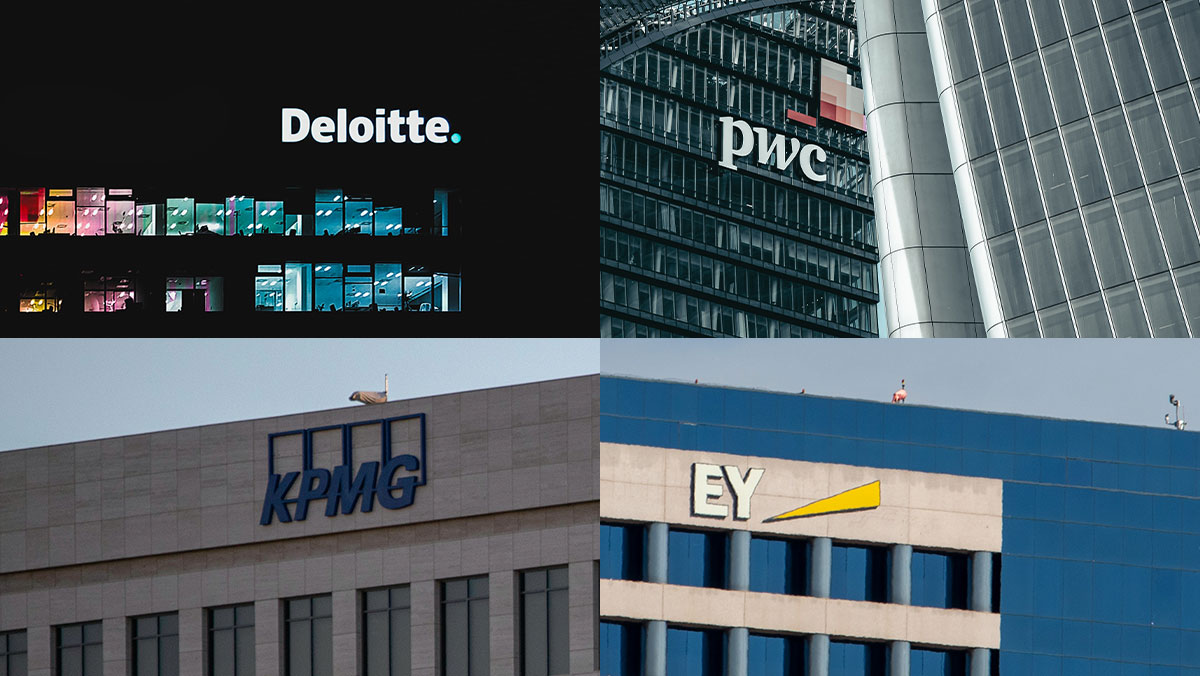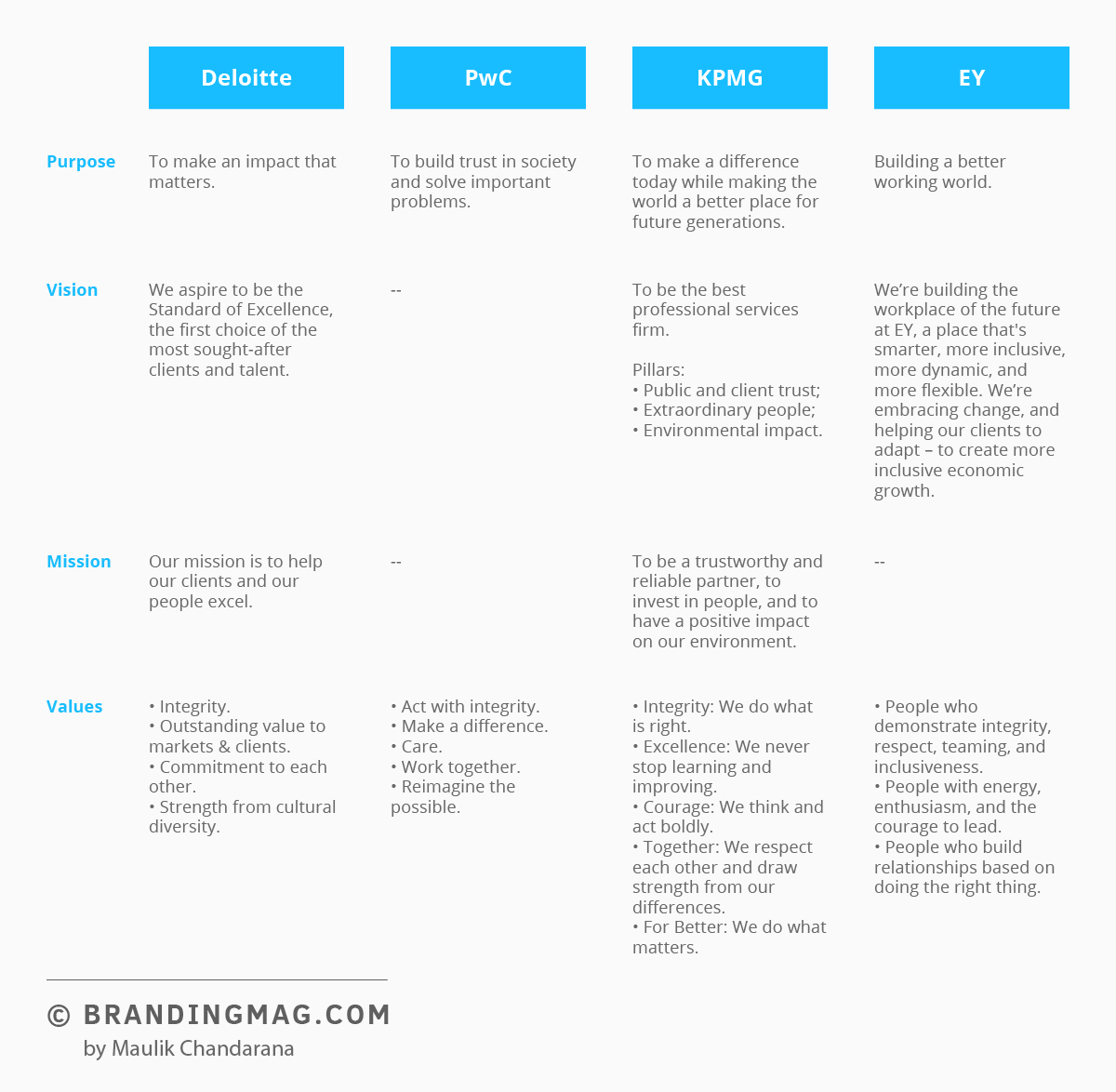
Consider a small or mid-size B2B firm, perhaps in a niche area of operations in the professional services space. It is like the proverbial David.
Then there are the Big 4 – a collective that can be thought of as Goliath. While they’re unlikely to fall anytime soon, there’s quite a lot that the David firms may stand to learn from the Big 4. Especially if they are building their own brands. The journeys of the Big 4 brands are full of anecdotal nuggets – some of which are fantastic insights on what to do, and some are just for chuckles and a guide on what to avoid.
Let’s start with two interesting gaffes related to brand naming in makeovers.
Monday died
 The first day of the week, Monday, is the most dreaded day for many. But not for PricewaterhouseCoopers. Today, operating under the PwC brand name, their consulting offering literally christened itself as “Monday” in 2002. The name created quite a flutter. The then CEO Greg Brenneman has been quoted saying, “Our new name, Monday, is exactly what we want it to be as we create our new business: a real word, concise, recognizable, global, and the right fit for a company that works hard to deliver results.” The company defended its name and agreed that there could be varying reactions, but the name is secondary in the consulting space and people would eventually live with it. But Monday died. It was let go when IBM Global Business Services (now, rebranded as IBM Consulting) absorbed the practice. The Monday Blues seem to be a reality.
The first day of the week, Monday, is the most dreaded day for many. But not for PricewaterhouseCoopers. Today, operating under the PwC brand name, their consulting offering literally christened itself as “Monday” in 2002. The name created quite a flutter. The then CEO Greg Brenneman has been quoted saying, “Our new name, Monday, is exactly what we want it to be as we create our new business: a real word, concise, recognizable, global, and the right fit for a company that works hard to deliver results.” The company defended its name and agreed that there could be varying reactions, but the name is secondary in the consulting space and people would eventually live with it. But Monday died. It was let go when IBM Global Business Services (now, rebranded as IBM Consulting) absorbed the practice. The Monday Blues seem to be a reality.
EY didn’t notice a bulge
 What is EY today has had multiple names in the past: Ernst & Young, Earnst, and E&Y. Yes, EY sounds younger and possibly more ‘in tune with the times’. But the firm needed to pump in a bit of its auditing prowess harder for its own sake. Even a Google search would have helped. ‘EY!’ turned out to be the title of a gay magazine led by a Spanish creative director, with some ‘raunchy’ images and links cropping up. It was totally avoidable. Maybe the consequential PR would have shaken some folks at EY. But then they stuck and today, Google is well-mannered.
What is EY today has had multiple names in the past: Ernst & Young, Earnst, and E&Y. Yes, EY sounds younger and possibly more ‘in tune with the times’. But the firm needed to pump in a bit of its auditing prowess harder for its own sake. Even a Google search would have helped. ‘EY!’ turned out to be the title of a gay magazine led by a Spanish creative director, with some ‘raunchy’ images and links cropping up. It was totally avoidable. Maybe the consequential PR would have shaken some folks at EY. But then they stuck and today, Google is well-mannered.
Choosing an appropriate brand name is tricky. But of the Big 4, three of them seem to have found nirvana in settling for an acronym or an abbreviation. Unlike Deloitte which stands out from the pack. As Suzanne Gylfe, Brand and Marketing managing director, Deloitte LLP, is quoted, “Having [a name] around a real person makes a difference.”
Beyond the name games
Names apart, while we can continue to do an in-depth brand journey scroll for more, perhaps, it is prudent to take a quick glance at the following table to move faster and cull out points.
The table summarizes the purpose, vision, mission, and values of the Big 4.
Clearly, there are words and lots of them.
Do they inspire? Yes and no. Are they somehow putting it to practice? Yes and no.
Some like Deloitte have sponsored several major sports events and activities including the 2012 Summer Olympics. Others like EY have a ‘carbon ambition’ focused on net zero and a corporate responsibility program called EY Ripples to harness people to accelerate environmental sustainability across communities. In fact, they’ve also recently donned giant Post-It notes on their buildings with To-Do points that encourage sustainability.
 The narratives and imagery in the communication of these firms are getting more people and planet centric. Talk of larger impact and concern for humans is a focus.
The narratives and imagery in the communication of these firms are getting more people and planet centric. Talk of larger impact and concern for humans is a focus.
Yet, with the words and intentions and actions, there seems to be so much that is same sounding and similar seeming. Exactly, where the David firms we speak of can take a cue. They can build themselves on distinctness that is radical.
That said, it may be easy to say that professional services firms simply ‘sell air’ and the only tangibles delivered are long-drawn decks. Yet the importance of their offerings to clients’ businesses is significant. That’s why the decision to choose one firm over the other merits discussion of creating brands that instill trust and a sense of emotional connection. And this is a matter that concerns all players – small or big.
The opportunity to differentiate: single-minded and simple-minded
The Big 4 purposes and promises may be distilled into common factors like trust, helping clients grow, commitment, impetus for environment consciousness, etc. The generic nature of these is the biggest opportunity for small and mid-size organizations.
One way to start could be radical dumping of Vision, Mission, Value, and other such ‘props’. This is not to say they aren’t important but perhaps with less ‘fluff’, there could be a possibility of inducing agility of understanding with simple and truncated articulations and even the total doing away of non-essentials. Because after all, a brand strategy is a set of choices.
| Just to think:
How Human can we get? |
| One may remember the Oscar fiasco where La La Land got announced accidentally as the best picture where in fact it was Moonlight that was the winner. It was a case of a PwC consultant mixing up envelopes and not being fast enough to register the snafu. Of course, PwC threw him and his partner to the wolves. They were fired. Could this ‘human error’ be so grave that it wasn’t pardonable?
EY, who handles the Golden Globes, announced that they could never do that as their processes were such that it wasn’t possible. Trying to get a one-up perhaps? This is where we ask – could a new age David firm, who agreeably may not be at the Oscars, but when in a situation, say, “Yes, there could be mistakes. But we’ll evaluate it. And if it’s human, then it’s human and we should let it go.” Can it be that simple? |
Think of integrating authenticity and a people-centric approach in this and imagine how powerful the organization could be. What if single-minded propositions were exactly that – single-minded? And let’s add ‘simple-minded’ too.
For example, a firm could have a proposition like ‘The Best Talent’. This may seem either restrictive or even lofty at the first glance. But if one delves deeper, the possibilities of storytelling to different stakeholders and building the firm by really abiding by the proposition in terms of actions can be a real growth driver.
To live the proposition, the firm aims to recruit the best talent, intermingle the best talent such that they thrive amidst each other’s companies, and offer the best talent to clients. That’s actions and stories; single-minded and simple-minded.
In many ways, the firm needs to know what it stands for and even know what it opposes. The passion to stand for one’s belief is more powerful than its articulation on paper and in speeches. To illustrate, let’s continue with the above firm with the proposition of ‘The Best Talent’. They could make it a mandate that its people will work only in human hours and ensure this will happen despite client pressures or the urge to bill more by the hour.
Those can be the brave new B2B professional services who can create their own standing.
To add, in an earlier conversation with a reputed head of a global consultancy, I was told, “…if you shed complexity, what will you charge the clients for? There is a need to preserve complexity or even create an illusion of one that the consultants can then show they are solving. Profits come from that…” The archaic lens needs to be pulled off. Yes, the world is a complex place, things get more complex every day, but adding to that complexity and making a buck off it seems something that David firms can look down upon and, eventually, do away with. Perhaps, that is where they could lay the foundation of the so-called ‘new age world ethos’.
Ending it with Russia
To end the piece, let’s see what’s happening with the Big 4 in Russia. With a spate of exits of Western organizations, the Big 4 are on the move, too. Three of the Big 4’s Russian arms have been rebranded. PwC has become Technologies of Trust. Deloitte has become Business Solutions and Technologies and EY is now Audit Technologies and Solutions Centre.
We do not get to see a Monday but we do see descriptive and non-imaginative names. It’s like ‘what you see is what you get’. And what’s interesting is that one sees ‘technology’ as a common recurrence among the names. Well, business and technology are inseparable, and the new names are just a reflection of that.
To sum up, plainly put, Deloitte, EY, PwC, and KPMG – the Big 4 – are businesses in the professional services space. But seeing them comparatively reveals interesting insights, especially for newer firms. Also, there’s a glimpse of their narratives turning human and creative – as B2B businesses worldwide are being goaded to become ‘unboring’. Most importantly, there is an opportunity to be single-minded and simple-minded when it comes to new firms defining and distinguishing themselves.
Cover image source: Dan V, Sven Piper, and Mikita Yo

